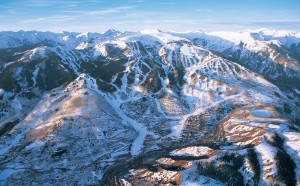There is a tried and true method for making embarrassing announcements that nobody will notice. Put out a press release during the holidays. It is a system used by politicians for years.
That explains the fairly scant coverage of a major policy shift for the U.S. Forest Service on the decades-old issue of federal control of western water rights. The announcement was made on New Year’s Eve. The Forest Service withdrew its controversial plan to require ski resorts to transfer their water rights to the federal government.
All the major Western ski resorts (122 of them, with over 23 million skier visits annually) are on national forests – not because the ski industry prefers federal land, but because the federal government owns all the big mountains. It does not, however, own the snow, the streams, and the water, which belong to the people of the various States. And all life in the West, from major California cities to Colorado skiing, depends upon the carefully controlled use of that water – and on a delicate balance of private property, State water laws, and interstate agreements. That has been a sticking point with the feds for years, who want to own and control all the water that crosses their land. None of us own or control all the water that crosses our land, but federal officials think they should.This legal and political battle has been raging since I worked for Colorado Senator Bill Armstrong 30 years ago. But this latest overreach went too far even for federal courts, which dealt the agency a major blow in the ski area case in 2012. The court sided with the ski industry and said such a requirement would be a taking of private property without compensation, as forbidden by the Bill of Rights. So in 2014 the agency proposed a lesser requirement: ski areas would have to prove there is enough water to operate into the future, as a condition of their permit.
It is somewhat daunting to be asked to prove how much water might be available in the future to meet an arbitrary “sustainability” standard, but at least it stopped short of an actual federal taking of the water right. So that is what the Forest Service has finally decided it must accept, not because the agency knows it went too far, but because it simply could not win the case. The government fears its reputation with environmentalists may suffer from this retreat, and thus the New Year’s Eve announcement. For the time being, that ends the ski area case, with the government officially acknowledging that water rights, even on national forests, are a matter of State law.
The battle is temporarily won, but only in the same way German and Allied soldiers laid down their arms on a snowy Christmas during World War I and sang carols together, only to pick up their guns and resume shooting the next day. It is most unlikely that the Forest Service will really give up on something it has wanted for 30 years, just because it lost one court case.
The evolution of this issue is a good example of how well-meaning environmental protections have been twisted in recent years to push a different agenda. National Forests were created to be preserved for the use and enjoyment of future generations, and to allow access to the resources for the current generation. The 1897 enabling law was passed “to improve and protect the forests” for two specified purposes: “to secure favorable conditions of water flows, and to furnish a continuous supply of timber.”
It was understood that if greedy people cut all the trees, the forests couldn’t produce wood for future generations, and also it would degrade the quality of water flowing from those forests. So the Forest Service was to manage the lands to guarantee the availability of wood and water.
Federal control over water could only serve a completely different purpose, to stop some current uses of water. Obviously preserving public land requires protecting the associated water, too, but that is not where the discussion ends, because that is not what the argument is really about. It is, quite simply, the use of popular water issues to limit growth, and to impede already-existing businesses, farm and ranches, cities and towns.
If that were my agenda, and I had to retreat in the face of humiliation by the federal courts, I might announce it in the middle of the night on New Year’s Eve, too.
(This column first appeared in the Grand Junction Daily Sentinel January 8, 2016)





Comments on this entry are closed.